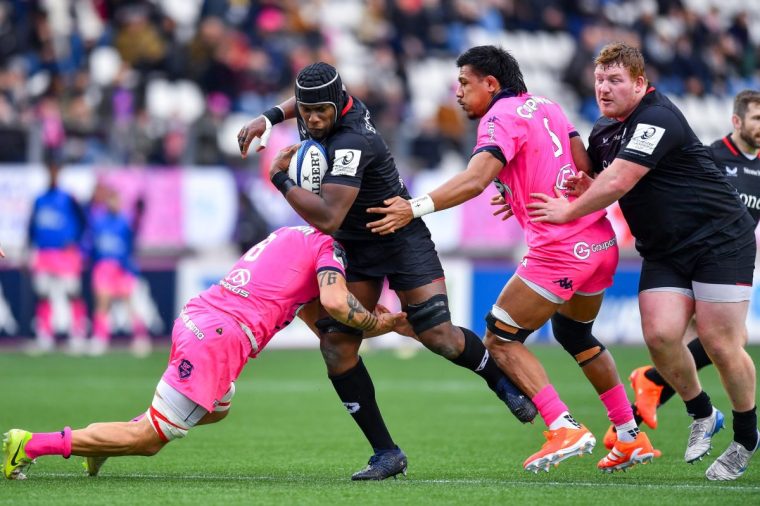There hasn’t been an English captain of the British & Irish Lions since Martin Johnson in 1997 and 2001.
But Maro Itoje showed in Saracens’ win over Northampton Saints many reasons why he would be the right man to end the wait in 2025.
At the same time there were glimpses of the edginess and enigma in Itoje that may explain why his name has often been linked to international captaincy throughout his senior career, without him landing the blue-riband role.
The next three months could confirm Itoje as the man for Lions head coach Andy Farrell’s plan, in a position for which Ireland’s captain and No 8 Caelan Doris is the current bookies’ favourite – although remember Doris’s fellow Irishman and Leinster forward James Ryan was the even-money favourite at the start of this year, so impressions can quickly change.
Saracens next have Premiership matches against the two teams above them in the table – Bath and Bristol – followed by pivotal Champions Cup meetings with Munster and Castres, then it will be the Six Nations.
Itoje turned 30 a couple of months ago and with 88 England caps and six Lions Tests on the last two tours, and a rampant return to form lately after a wobble associated with his revelation 18 months ago of an unspecified “underlying health issue”, he comfortably ticks the essential boxes.
Add to that the often-stated need for a Lions captain to be one of the first names on the team sheet, and Itoje scores there too, whatever the competing claims of second-rows such as Ireland’s Joe McCarthy and Tadhg Beirne – either of whom would make a great foil to Itoje on the 2025 trip to Australia next summer.
This season, additionally, we have seen Itoje as an official on-field leader for the first time since, as a young buck, he skippered Saracens’ second team to an Anglo-Welsh Cup, and England’s Under-20s to the world championship.
Having seen Brad Barritt retire and Owen Farrell move to France and Jamie George be partially preoccupied with leading England, Saracens have finally turned to Itoje.
On Sunday, we saw him with the extra responsibility of leaning over and into referee Adam Leal to make queries over this or that penalty award, in a 39-24 success for Saracens that was founded on a fantastic first-half of 24-0.

In 1997, Sir Ian McGeechan picked Johnson to literally look down on opponents in the pre-match rituals and out on the field.
Itoje offers the same appeal and Saracens boss Mark McCall on Sunday referred to him leading by example as “he is one of the best players on the pitch in every game that we play.”
Asked if Itoje was also becoming more of a club man, now he is the designated face of the team, McCall bridled and said: “He’s always been a good team man. He’s who he always was, it’s just he is now the captain.”
This may well be true, but as an example, the nods Itoje used to give to upcoming youngsters are now being heard externally.
He bigged up the emerging scrum-half Charlie Bracken and wing Tobias Elliott to The i Paper in pre-season and on Sunday, on TNT Sports after the match, he praised emergency replacement Angus Hall as someone “sitting his A-levels eight months ago” and Sarries “developing our young guys”.
For England, Itoje was one of four vice-captains – that’s four in the matchday 23, for the avoidance of doubt – under George last month.
Meanwhile, his ability to run a line-out, and tackle and carry, barely need emphasising.
Nor does his iron will to win – on Sunday with the result beyond doubt, he was still pushing hard in the 77th minute, able to both fish into a ruck and reach to grab a Northampton player breaking away from it.
He also possesses a tendency to concede penalties, sometimes at a cost, sometimes at a strategic moment when his rugby intelligence may be a pace ahead of those who think he has simply made a blunder.
In Sunday’s match, Itoje went to the sin-bin for an upright, high tackle on Saints’ Tom Lockett – a challenge that with less lenient refereeing in previous seasons might have brought a red.
If it had happened on an away ground, there would probably have been greater uproar.
Itoje was also involved in the kind of angry scuffles we have seen many times provoked by Saracens’ celebration of tries and penalty awards and such-like.
These can stick in the craw of neutral or one-eyed observers, just as Itoje’s multiple trophies at club level were tainted for many by the salary-cap scandal.
In his 10-minute absence, Saints stole a line-out from Saracens and pulled the scoreline back to 24-12.
When Itoje returned, he typically nailed a line-out throw for a trademark try by George.
In that post-match interview Itoje showed an easy-going side that many Welsh, Irish and Scottish fans might be unfamiliar with, even after his decade at the top.
He expressed hope for jollof rice as a Christmas gift, and threw back his head in laughter as he asked presenter Craig Doyle if he knew what it was – a dish from Itoje’s family’s native west Africa, for those who are unsure.
Itoje also spoke of half-time as the chance for a team to “really put a foot on their opponents’ necks” – and that sounded extremely Johnson-esque.
The debate will ebb and flow before the Lions name their leader after the Six Nations, but there is no doubt Itoje possesses many of the magic ingredients.





Liz Truss needs to take her own advice, and cease and desist